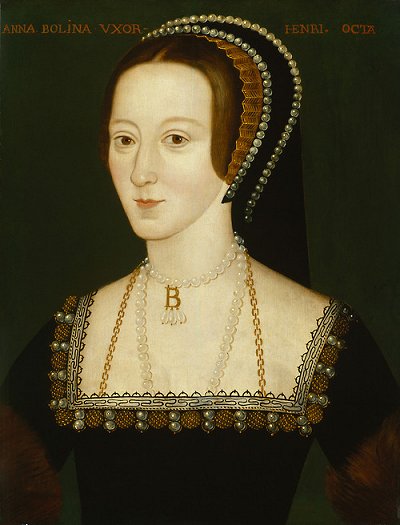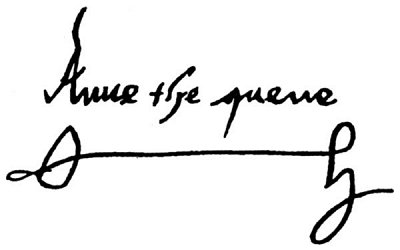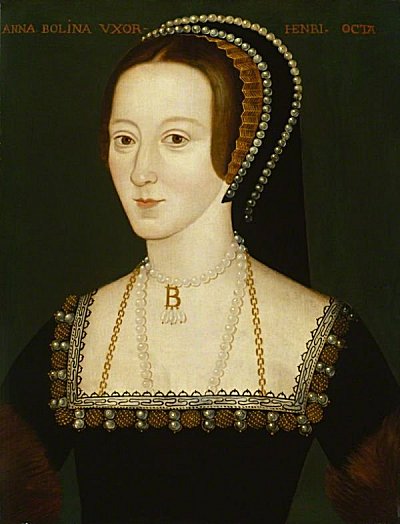Fleurs du Mal Magazine


Or see the index
In this second novel of Alison Weir’s epic Six Tudor Queens series, the acclaimed author and historian weaves exciting new research into the story of Anne Boleyn, Henry VIII’s most infamous wife, a woman ahead of her time whose very life—and death—forever changed a nation.
 Born into a noble English family, Anne is barely a teenager when she is sent from her family’s Hever Castle to serve at the royal court of the Netherlands. This strategic move on the part of her opportunistic father also becomes a chance for the girl to grow and discover herself. There, and later in France, Anne thrives, preferring to absorb the works of progressive writers rather than participate in courtly flirtations. She also begins to understand the inequalities and indignities suffered by her gender.
Born into a noble English family, Anne is barely a teenager when she is sent from her family’s Hever Castle to serve at the royal court of the Netherlands. This strategic move on the part of her opportunistic father also becomes a chance for the girl to grow and discover herself. There, and later in France, Anne thrives, preferring to absorb the works of progressive writers rather than participate in courtly flirtations. She also begins to understand the inequalities and indignities suffered by her gender.
Anne isn’t completely inured to the longings of the heart, but her powerful family has ambitious plans for her future that override any wishes of her own. When the King of England himself, Henry VIII, asks Anne to be his mistress, she spurns his advances—reminding him that he is a married man who has already conducted an affair with her sister, Mary. Anne’s rejection only intensifies Henry’s pursuit, but in the absence of a male heir—and given an aging Queen Katherine—the opportunity to elevate and protect the Boleyn family, and to exact vengeance on her envious detractors, is too tempting for Anne to resist, even as it proves to be her undoing.
While history tells of how Anne Boleyn died, this compelling new novel reveals how fully she lived.
“This is a stunning, engaging, comprehensive and convincing novel. . . . [Alison] Weir’s characterisation is superb, and this complex novel will be, without doubt, one of the most admired works of historical fiction of 2017.” – Historical Novels Review
Alison Weir is the New York Times bestselling author of numerous historical biographies, including The Lost Tudor Princess, Elizabeth of York, Mary Boleyn, The Lady in the Tower, Mistress of the Monarchy, Henry VIII, Eleanor of Aquitaine, The Life of Elizabeth I, and The Six Wives of Henry VIII, and the novels Anne Boleyn, A King’s Obsession; Katherine of Aragon, The True Queen; The Marriage Game; A Dangerous Inheritance; Captive Queen; The Lady Elizabeth; and Innocent Traitor. She lives in Surrey, England, with her husband.
Anne Boleyn, A King’s Obsession
A Novel
By Alison Weir
Part of Six Tudor Queens
Historical Fiction – Literary Fiction
Paperback
Publ. Penquin Random House
May 01, 2018
576 Pages
new books
fleursdumal.nl magazine
More in: - Book News, - Book Stories, Anne Boleyn, Archive W-X, Art & Literature News
![]()
Anne Boleyn
(1507?-1536)
O Death, Rock Me Asleep
DEATH, rock me asleep,
Bring me to quiet rest,
Let pass my weary guiltless ghost
Out of my careful breast.
Toll on, thou passing bell;
Ring out my doleful knell;
Let thy sound my death tell.
Death doth draw nigh;
There is no remedy.
My pains who can express?
Alas, they are so strong;
My dolour will not suffer strength
My life for to prolong.
Toll on, thou passing bell;
Ring out my doleful knell;
Let thy sound my death tell.
Death doth draw nigh;
There is no remedy.
Alone in prison strong
I wait my destiny.
Woe worth this cruel hap that I
Should taste this misery!
Toll on, thou passing bell;
Ring out my doleful knell;
Let thy sound my death tell.
Death doth draw nigh;
There is no remedy.
Farewell, my pleasures past,
Welcome, my present pain!
I feel my torments so increase
That life cannot remain.
Cease now, thou passing bell;
Rung is my doleful knell;
For the sound my death doth tell.
Death doth draw nigh;
There is no remedy.
Anne Boleyn poetry
fleursdumal.nl magazine
More in: Anne Boleyn, Archive A-B

Anne Boleyn
(1507?-1536)
Defiled is my name full sore
Through cruel spite and false report,
That I may say for evermore,
Farewell, my joy! Adieu comfort!
For wrongfully ye judge of me
Unto my fame a mortal wound,
Say what ye list, it will not be,
Ye seek for that can not be found.
Anne Boleyn poetry
fleursdumal.nl magazine
More in: Anne Boleyn, Archive A-B

ANNE BOLEYN (1507-1536)
It was for Anne that Henry VIII gave up the wife with whom he had lived for twenty years; it was for Anne that he broke his hitherto unbroken allegiance of England to the Pope of Rome; tl was for Anne that he braved the anger of the great powers of Europe.Yet it was this same Anne who, but two years after her marriage, was writing to her passionate lover the following heart-broken letter—while awaiting her death.
TO THE KING
SIR, Your Grace’s displeasure and my imprisonment are things so strange unto me, as what to write, or what to excuse, I am altogether ignorant. Whereas you send unto me (willing [me] to confess a truth, and to obtain your favour) by such an one whom you know to be mine ancient professed enemy. I no sooner conceived this message by him, than I rightly conceived your meaning; and, as you say, confessing a truth indeed may procure my safety, I shall with all willingness and duty perform your command.
But let not your Grace ever imagine that your poor wife will ever be brought to acknowledge a fault where not so much as a thought thereof proceeded. And to speak a truth, never prince had wife more loyal in all duty, and in all true affection, than you have ever found in Anne Boleyn; with which name and place I could willingly have contented myself, if God and your Grace’s pleasure had been so pleased. Neither did I at any time so far forget myself in my exaltation or received queenship, but that I always looked for such an alteration as now I find: for the ground of my preferment being on no surer foundation than your Grace’s fancy, the least alteration I knew was fit and sufficient to draw that fancy to some other subject. You have chosen me from a low estate to be your queen and companion, far beyond my desert or desire. If then you found me worthy of such honour, good your Grace, let not any light fancy or bad counsel of mine enemies withdraw your princely favour from me; neither let that stain, that unworthy stain, of a disloyal heart towards your good Grace, ever cast so foul a blot on your most dutiful wife, and the infant princess, your daughter.

Try me, good king, but let me have a lawful trial; and let not my sworn enemies sit as my accusers and my judges; yea, let me receive an open trial, for my truth shall fear no open shame. Then shall you see either mine innocency cleared, your suspicions and conscience satisfied, the ignominy and slander of the world stopped, or my guilt openly declared; so that, whatsoever God or you may determine of me, your Grace may be freed from an open censure; and mine offence being so lawfully proved, your Grace is at liberty, both before God and man, not only to execute worthy punishment on me, as an unlawful wife, but to follow your affection already settled on that party for whose sake I am now as I am, whose name I could some good while since have pointed unto; your Grace not being ignorant of my suspicion therein.
But if you have already determined of me; and that not only my death, but an infamous slander, must bring you the enjoying of your desired happiness; then I desire of God that he will pardon your great sin therein, and likewise my enemies the instruments thereof; and that He will not call you to a strict account for your unprincely and cruel usage of me, at his general judgementseat, where both you and myself must shortly appear; and in whose judgement, I doubt not, whatsoever the world may think of me, mine innocence shall be openly known and sufficiently cleared.

My last and only request shall be, that myself may only bear the burden of your Grace’s displeasure, and that it may not touch the innocent souls of those poor gentlemen who, as I understand, are likewise in strait imprison¬ment for my sake. If ever I have found favour in your sight, if ever the name of Anne Boleyn hath been pleasing in your ears, then let me obtain this request; and I will so leave to trouble your Grace any further; with mine earnest prayers to the Trinity, to have your Grace in his good keeping, and to direct you in all your actions. From my doleful prison in the Tower, this 6th of May. Your most loyal and ever faithful wife.

ANNE BOLEYN (1536)
fleursdumal.nl magazine
More in: Anne Boleyn, Archive A-B

Anne Boleyn?
(1507?-1536)
O Death, Rock Me Asleep
DEATH, rock me asleep,
Bring me to quiet rest,
Let pass my weary guiltless ghost
Out of my careful breast.
Toll on, thou passing bell;
Ring out my doleful knell;
Let thy sound my death tell.
Death doth draw nigh;
There is no remedy.
My pains who can express?
Alas, they are so strong;
My dolour will not suffer strength
My life for to prolong.
Toll on, thou passing bell;
Ring out my doleful knell;
Let thy sound my death tell.
Death doth draw nigh;
There is no remedy.
Alone in prison strong
I wait my destiny.
Woe worth this cruel hap that I
Should taste this misery!
Toll on, thou passing bell;
Ring out my doleful knell;
Let thy sound my death tell.
Death doth draw nigh;
There is no remedy.
Farewell, my pleasures past,
Welcome, my present pain!
I feel my torments so increase
That life cannot remain.
Cease now, thou passing bell;
Rung is my doleful knell;
For the sound my death doth tell.
Death doth draw nigh;
There is no remedy.
Anne Boleyn poetry
fleursdumal.nl magazine
More in: Anne Boleyn, Archive A-B
Thank you for reading Fleurs du Mal - magazine for art & literature